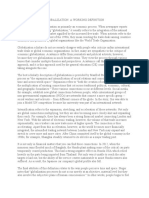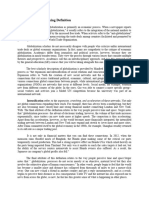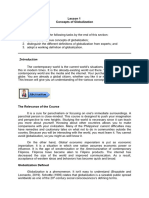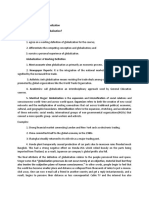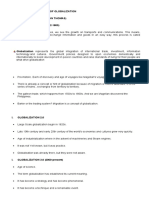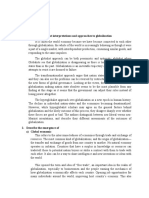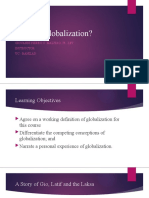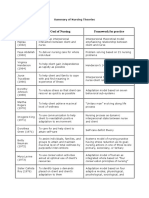0 ratings0% found this document useful (0 votes)
115 viewsModule 1 Globalization
Module 1 Globalization
Uploaded by
Resha Mae Gordon OrañaThis document provides an introduction to the concept of globalization. It begins with a fictional story about two students from different countries becoming friends to illustrate how globalization operates at multiple levels. It then discusses competing conceptions of globalization, with most viewing it primarily as an economic process, while academics see it more broadly. The best definition presented is that globalization is the expansion and intensification of social relations and consciousness across world-time and space. This involves both creating new networks and multiplying existing connections that cross traditional boundaries.
Copyright:
© All Rights Reserved
Available Formats
Download as DOC, PDF, TXT or read online from Scribd
Module 1 Globalization
Module 1 Globalization
Uploaded by
Resha Mae Gordon Oraña0 ratings0% found this document useful (0 votes)
115 views2 pagesThis document provides an introduction to the concept of globalization. It begins with a fictional story about two students from different countries becoming friends to illustrate how globalization operates at multiple levels. It then discusses competing conceptions of globalization, with most viewing it primarily as an economic process, while academics see it more broadly. The best definition presented is that globalization is the expansion and intensification of social relations and consciousness across world-time and space. This involves both creating new networks and multiplying existing connections that cross traditional boundaries.
Copyright
© © All Rights Reserved
Available Formats
DOC, PDF, TXT or read online from Scribd
Share this document
Did you find this document useful?
Is this content inappropriate?
This document provides an introduction to the concept of globalization. It begins with a fictional story about two students from different countries becoming friends to illustrate how globalization operates at multiple levels. It then discusses competing conceptions of globalization, with most viewing it primarily as an economic process, while academics see it more broadly. The best definition presented is that globalization is the expansion and intensification of social relations and consciousness across world-time and space. This involves both creating new networks and multiplying existing connections that cross traditional boundaries.
Copyright:
© All Rights Reserved
Available Formats
Download as DOC, PDF, TXT or read online from Scribd
Download as doc, pdf, or txt
0 ratings0% found this document useful (0 votes)
115 views2 pagesModule 1 Globalization
Module 1 Globalization
Uploaded by
Resha Mae Gordon OrañaThis document provides an introduction to the concept of globalization. It begins with a fictional story about two students from different countries becoming friends to illustrate how globalization operates at multiple levels. It then discusses competing conceptions of globalization, with most viewing it primarily as an economic process, while academics see it more broadly. The best definition presented is that globalization is the expansion and intensification of social relations and consciousness across world-time and space. This involves both creating new networks and multiplying existing connections that cross traditional boundaries.
Copyright:
© All Rights Reserved
Available Formats
Download as DOC, PDF, TXT or read online from Scribd
Download as doc, pdf, or txt
You are on page 1of 2
Module 1
What is Globalization
Objectives:
1. Agree on a working definition of globalization;
2. differentiate the competing conceptions of globalization; and
3. Narrate a personal experience of globalization.
Introduction:
Gio and Latif’s story is fictional but very plausible since it is, in fact, based on
the real-life experience of one of the authors. It was through such friendships that
one was able to appreciate the meaning and impact of globalization. We begin
our definition of globalization with this narrative to illustrate how concrete the
phenomenon is. The story shows how globalization operates at multiple,
intersecting levels. The spread of Filipino TV into Malaysia suggests how fast this
popular culture has proliferated and criss-crossed all over Asia.
Most accounts view globalization as primarily an economic process. When a
newspaper reports that nationalists are resisting “globalization,” it usually refers
to the integration of the national markets to a wider global market signified by the
increased free trade. When activists refer to the “anti-globalization” movement of
the 1990s, they mean resisting the trade deals among countries facilitated and
promoted by global organizations like the World Trade Organization.
Globalization scholars do not necessarily disagree with people who criticize
unfair international trade deals or global economic organizations. In fact, many
are sympathetic to the critique of economic globalization. Academics differ from
journalists and political activists, however, because they see globalization in
much broader terms. They view the process through various lenses that consider
multiple theories and perspectives. Academics call this an interdisciplinary
approach, and it is this approach used by the general education (GE) courses
that you will be taking alongside this one.
The best scholarly description of globalization is provided by Manfred Steger
who described the process as the expansion and intensification of social
relations and consciousness across world-time and across world-space.
Expansion refers to “both the creation of new social networks and the
multiplication of existing connections that cut across traditional political,
economic, cultural, and geographic boundaries.” These various connections
occur at different levels. Social media, for example, establish new global
connections between people, while international groups of non-governmental
organizations (NGOs) are networks that connect a more specific group---social
workers and activists-- from different corners of the globe. In the story, Gio was
able to join a Model UN competition because his university was part of an
international network.
Intensification refers to the expansion, stretching, and acceleration of
these networks? Not only are global connections multiplying, but they are also
becoming more closely-knit and expanding their reach. For example, there has
always been a strong financial market connecting London and New York. With
the advent of electronic trading, however, the volume of that trade increases
exponentially, since traders can now trade more at higher speeds. The
connection is thus accelerating. Apart from this acceleration, however, as the
world becomes more financially integrated, the intensified trading network
between London and New York may expand and stretch to cover more and more
cities. After China committed itself to the global economy in the 1980s, for
example, Shanghai steadily returned to its old role as a major trading post.
Activity:
Watch: https://www.youtube.com/watch?v=0AS65cI0pJA
You might also like
- The Importance of Being LittleDocument2 pagesThe Importance of Being Littlewamu8850% (2)
- Translating Audio-Visual Humor - A Case StudyDocument9 pagesTranslating Audio-Visual Humor - A Case Studylixiaoxiu100% (4)
- Prelim TWCDDocument24 pagesPrelim TWCDMaye ArugayNo ratings yet
- Module 1 - Contemporary WorldDocument17 pagesModule 1 - Contemporary WorldJeanette Josol100% (1)
- Module 1-Lesson 1Document4 pagesModule 1-Lesson 1princesslove.taduraNo ratings yet
- GlobalizationDocument10 pagesGlobalizationaireuNo ratings yet
- Globalization-A Working DefinitionDocument2 pagesGlobalization-A Working DefinitionOfficial SalaxaNo ratings yet
- Global ExperiencesDocument13 pagesGlobal ExperiencesDanna InocandoNo ratings yet
- Contemporary World by YotrulyDocument46 pagesContemporary World by YotrulyDopias FakeNo ratings yet
- Ge3 - ReviewerDocument15 pagesGe3 - ReviewerRonan MoralesNo ratings yet
- GLBLZTNDocument3 pagesGLBLZTNCharmin AlegreNo ratings yet
- 1st ContemporaryDocument2 pages1st Contemporarybyata pausanosNo ratings yet
- Zeus Salazar Pantayong Pananaw Isang PaliwanagDocument19 pagesZeus Salazar Pantayong Pananaw Isang Paliwanagduchess2byunNo ratings yet
- 1.1 Defining Globalization: The Story of Gio, Latif and The LaksaDocument18 pages1.1 Defining Globalization: The Story of Gio, Latif and The LaksaRachel PetersNo ratings yet
- CW Mod 1-2 Coverage PDFDocument13 pagesCW Mod 1-2 Coverage PDFJEHAN ROSE DIMPLE ALINo ratings yet
- Lesson 1 What Is The Globalization?: Globalization: A Working DefinitionDocument24 pagesLesson 1 What Is The Globalization?: Globalization: A Working DefinitionCherry BanadaNo ratings yet
- GEC 103 Maam RaihanieDocument6 pagesGEC 103 Maam RaihanieNesh Rain IINo ratings yet
- Structure of Globalization - FinalDocument19 pagesStructure of Globalization - FinalMark Kenneth Valerio100% (6)
- Magic No.1Document31 pagesMagic No.1alburo.gmmNo ratings yet
- CW Mod 1 CoverageDocument11 pagesCW Mod 1 CoverageJEHAN ROSE DIMPLE ALINo ratings yet
- Reflection PaperszxcDocument6 pagesReflection PaperszxcAnggeNo ratings yet
- Cheat ShitDocument45 pagesCheat ShitMiguel Noble BituinNo ratings yet
- Contempo Reviewer MidtermDocument17 pagesContempo Reviewer Midtermbunnydons1996No ratings yet
- Soc Sci 1Document14 pagesSoc Sci 1JOY YangcoNo ratings yet
- International Studies-Final Exam-PinkihanDocument17 pagesInternational Studies-Final Exam-PinkihanBielan Fabian GrayNo ratings yet
- Globalization ReviewerDocument45 pagesGlobalization ReviewerKoi KiNo ratings yet
- Contemporary World Lesson 1-2Document9 pagesContemporary World Lesson 1-2Mark John Albesa CrebilloNo ratings yet
- Contemporary World Lesson 12Document12 pagesContemporary World Lesson 12Zyrelle RuizNo ratings yet
- Module 1 6 Gec 005 The Contemporary WorldDocument31 pagesModule 1 6 Gec 005 The Contemporary WorldJim Jose AngNo ratings yet
- Module 1 Introduction To GlobalizationDocument12 pagesModule 1 Introduction To GlobalizationEmilan TipayNo ratings yet
- The Contemporary WorldDocument15 pagesThe Contemporary WorldDebbie FernandezNo ratings yet
- Gobalization Impact On DevelopmentDocument5 pagesGobalization Impact On DevelopmentMishaal MalikNo ratings yet
- Unit 1-Apura PDFDocument18 pagesUnit 1-Apura PDFrose ann tesoraNo ratings yet
- Acitvity 2 - EssayDocument4 pagesAcitvity 2 - EssayPaul Zachary A. DandanNo ratings yet
- The Contemporary World PrelimDocument6 pagesThe Contemporary World Prelimleeandrei022000No ratings yet
- Purposive CommunicationDocument13 pagesPurposive CommunicationMaye PilapilNo ratings yet
- Lesson 1 Globalization OutlineDocument3 pagesLesson 1 Globalization OutlineJayr Gutierrez100% (1)
- CONWDocument122 pagesCONWStephanie DimaculamganNo ratings yet
- TCW ReviewerDocument29 pagesTCW ReviewerReeze Vreena TamarayNo ratings yet
- Contemporary World Slides Week 1 2Document26 pagesContemporary World Slides Week 1 2markjhonsenolorazaNo ratings yet
- GLOBALIZATIONDocument4 pagesGLOBALIZATIONPrincess Says MarquezNo ratings yet
- Lesson 1: The Structures of GlobalizationDocument30 pagesLesson 1: The Structures of GlobalizationLeanne Princess GamboaNo ratings yet
- Gec 003Document27 pagesGec 003PATRICEANNE CAISIPNo ratings yet
- The Contemporary WorldDocument13 pagesThe Contemporary WorldGeraldine De Guzman BalgoaNo ratings yet
- Contemporary World: GlobalizationDocument4 pagesContemporary World: GlobalizationAllyza Marie PeñaNo ratings yet
- GE 9 Chapter IDocument9 pagesGE 9 Chapter IhoriondovNo ratings yet
- Contemporary World ReviewerDocument49 pagesContemporary World ReviewerAngelica CalubayNo ratings yet
- ActivityDocument10 pagesActivityAngel Noah RabongNo ratings yet
- Globalization PrentationDocument26 pagesGlobalization Prentationhayat hanimNo ratings yet
- Prelim L1 IntroductiontoGlobalizationDocument11 pagesPrelim L1 IntroductiontoGlobalizationIra Charisse BurlaosNo ratings yet
- Contemporary: Introduction To Globalization Lesson 1. What Does The Contemporary World Mean?Document13 pagesContemporary: Introduction To Globalization Lesson 1. What Does The Contemporary World Mean?Ariadna ApolonioNo ratings yet
- C1 Introduction To GlobalizationDocument5 pagesC1 Introduction To GlobalizationBeautiful LifeNo ratings yet
- The Contemporary WorldDocument48 pagesThe Contemporary WorldCharie Mae GagapNo ratings yet
- GlobalizationDocument13 pagesGlobalizationavnidtuNo ratings yet
- Contempo Unit 1Document19 pagesContempo Unit 1PjungNo ratings yet
- Globalisation - IntroductionDocument14 pagesGlobalisation - IntroductionDsk ReddyNo ratings yet
- What Is GlobalizationDocument19 pagesWhat Is GlobalizationGiovanni Pierro C Malitao JrNo ratings yet
- Cworld 030 Study Guide For Prelim ExaminationDocument7 pagesCworld 030 Study Guide For Prelim ExaminationMary Ann Peñaflorida MagbanuaNo ratings yet
- Untitled DocumentDocument3 pagesUntitled DocumentReinan SalasNo ratings yet
- The Contemporary World: Chapter 1Document5 pagesThe Contemporary World: Chapter 1Jean OpallaNo ratings yet
- Contemporary WorldDocument12 pagesContemporary WorldLouie D.No ratings yet
- Ignacio Case Study 1 EcondevDocument8 pagesIgnacio Case Study 1 EcondevResha Mae Gordon OrañaNo ratings yet
- 10 Worksheets SemDocument15 pages10 Worksheets SemResha Mae Gordon OrañaNo ratings yet
- My Inventory: Made in The Philippines Foreign BrandsDocument2 pagesMy Inventory: Made in The Philippines Foreign BrandsResha Mae Gordon OrañaNo ratings yet
- Financial Markets Pcu Integrated Syllabi Format.1 5Document7 pagesFinancial Markets Pcu Integrated Syllabi Format.1 5Resha Mae Gordon OrañaNo ratings yet
- The United Nations Explained: Its Purpose, Power and ProblemsDocument3 pagesThe United Nations Explained: Its Purpose, Power and ProblemsResha Mae Gordon OrañaNo ratings yet
- HistDocument8 pagesHistSamrat Rick DeyNo ratings yet
- Final Copy of Body Ritual SheetDocument2 pagesFinal Copy of Body Ritual SheetallidissickkNo ratings yet
- Here, Now & Tomorrow: Bonisile MakubaloDocument24 pagesHere, Now & Tomorrow: Bonisile MakubaloOvie OvieNo ratings yet
- English Language Learners and Students With AutismDocument8 pagesEnglish Language Learners and Students With AutismAydila SaputriNo ratings yet
- Implications of Plato's PhilosophyDocument2 pagesImplications of Plato's PhilosophyAtukunda EdwinNo ratings yet
- Measurement and EvaluationDocument18 pagesMeasurement and Evaluationaparna75% (4)
- Week 4 - Suhaila Humairo SidiqDocument3 pagesWeek 4 - Suhaila Humairo Sidiq4D - SUHAILA HUMAIRO SIDIQ - 035No ratings yet
- Unit 1 Legal Studies - Area of Study 1Document3 pagesUnit 1 Legal Studies - Area of Study 1cNo ratings yet
- 10 Creating-A-Positive-School-CultureDocument8 pages10 Creating-A-Positive-School-Cultureaien nillascaNo ratings yet
- 05 Hatt-Klonk PostcolonialismDocument8 pages05 Hatt-Klonk PostcolonialismStergios Sourlopoulos100% (1)
- Republic Act No. 7893Document4 pagesRepublic Act No. 7893Shiela Noble CandoNo ratings yet
- Year 3 Step by Step WritingDocument6 pagesYear 3 Step by Step Writingvathiyar78No ratings yet
- Proiectare de Lungă Durată, Engleză, Clasa A XIIaDocument39 pagesProiectare de Lungă Durată, Engleză, Clasa A XIIaVictoriaVacarițaNo ratings yet
- British LiteratureDocument19 pagesBritish LiteratureLorenzo VaezNo ratings yet
- A Little History of Philosophy - (True Happiness) PDFDocument6 pagesA Little History of Philosophy - (True Happiness) PDFKanz EmadNo ratings yet
- Al MawardiDocument8 pagesAl Mawardiatlizan75% (4)
- Distributive Justice in RawlsDocument9 pagesDistributive Justice in RawlsPETERESCRIVANo ratings yet
- Culture of PakistanDocument12 pagesCulture of PakistanahmadkamranNo ratings yet
- Project Jomar V 2.0Document14 pagesProject Jomar V 2.0Jomar Gasilla NavarroNo ratings yet
- ENG 1020 SyllabusDocument9 pagesENG 1020 SyllabusChank SmithNo ratings yet
- Rizal - Group 4Document7 pagesRizal - Group 4kristiene kyle aquinoNo ratings yet
- Entangled Knowledges of The Black Sea: Confrontation and Convergence Between Turkish Fishermen and Marine ScientistsDocument426 pagesEntangled Knowledges of The Black Sea: Confrontation and Convergence Between Turkish Fishermen and Marine ScientistsssaskNo ratings yet
- Crescenttimes - Dec Issue - 2009Document20 pagesCrescenttimes - Dec Issue - 2009crescenttimesNo ratings yet
- Organizational Culture in Schools LevelsDocument6 pagesOrganizational Culture in Schools Levelsivavg2022-1082-42877100% (1)
- Summary of Nursing TheoriesDocument2 pagesSummary of Nursing TheoriesSeok Soo ShinNo ratings yet
- Thomas Reid On Memory: 1. Memory, Knowledge, and BeliefDocument17 pagesThomas Reid On Memory: 1. Memory, Knowledge, and Beliefprabhujaya97893No ratings yet
- Kindergarten Moy 2017 UpdatedDocument5 pagesKindergarten Moy 2017 Updatedapi-418290829No ratings yet
- Syllabus in Philippine Literature 13 14Document3 pagesSyllabus in Philippine Literature 13 14Leire JacutanNo ratings yet






